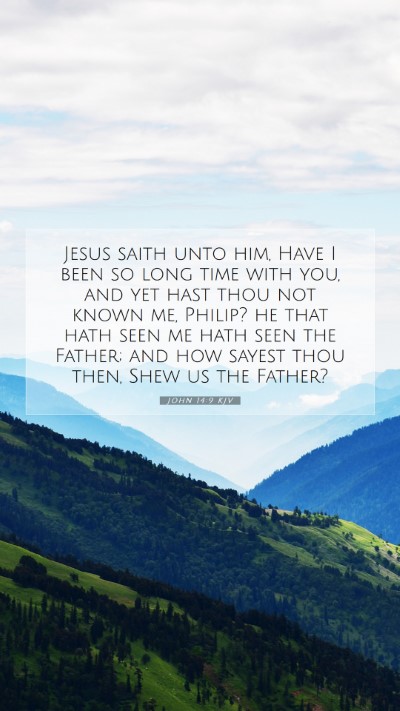Understanding John 14:9
Verse: John 14:9
"Jesus said to him, 'Have I been with you so long, and yet you do not know me, Philip? Whoever has seen me has seen the Father. How can you say, "Show us the Father"?'”
Meaning of John 14:9
This verse encapsulates a pivotal moment in Jesus' dialogue with His disciples, particularly addressing the question posed by Philip regarding the revelation of God the Father. The significance of this passage lies in its profound theological implications about the nature of Christ and His unity with the Father.
Insights from Commentary
- Matthew Henry: Henry emphasizes the intimate relationship between the Son and the Father. He notes that Jesus had been a living embodiment of God’s presence among men. To know the Son is to know the Father, showing that a true understanding of divinity is revealed through Christ’s actions and teachings.
- Albert Barnes: Barnes discusses the incredulity of Philip, who had witnessed numerous miracles yet still sought further assurance of God’s presence. He indicates that this question reflects a common struggle in grasping the true nature of God’s revelation in Christ. By seeing Jesus, they have seen the likeness and character of the Father.
- Adam Clarke: Clarke adds a historical perspective, suggesting that Philip’s request stemmed from a Jewish expectation of a visible manifestation of God. Clarke elaborates on the theological assertion that Jesus is the ultimate revelation of God — the earthly image of the invisible God.
Implications for Biblical Understanding
John 14:9 invites readers to delve deeper into the relationship between the Father and the Son, which is fundamental to Christian theology. This verse serves as a divine commentary on the nature of God as revealed through Christ, encouraging believers to explore the richness of Scripture for deeper insights.
Bible Verse Commentary
To interpret John 14:9 effectively, it’s essential to consider its context within the broader narrative of the Gospel of John, which emphasizes Jesus' divine nature and His mission to reveal the Father to humanity. This passage highlights key themes of revelation, faith, and discipleship.
Application of the Verse
The practical application of this verse can inspire believers to foster a deeper relationship with Christ. Understanding that through Jesus' character and actions one sees the nature of God can encourage a transformative faith experience.
Related Cross References
- John 1:18: "No one has ever seen God; the only God, who is at the Father's side, he has made him known."
- Colossians 1:15: "He is the image of the invisible God, the firstborn of all creation."
- Hebrews 1:3: "He is the radiance of the glory of God and the exact imprint of his nature, and he upholds the universe by the word of his power."
Engaging with This Scripture
As you reflect on John 14:9, consider the following:
- How does understanding Jesus as the revelation of the Father impact your faith?
- In what ways can you embody the teachings of Jesus in your daily life?
- How can this understanding enhance your discussions in Bible study groups or online Bible study?
Conclusion
John 14:9 is a powerful reminder of the unity and revelation of God through Christ. By studying this verse and engaging with its implications through various Bible study tools and resources, one can gain profound insights into the nature of God and His relationship with humanity.
Through this verse, we can explore the themes of divine presence, revelation, and the transformative nature of a relationship with Christ, enabling believers to understand their faith more deeply and apply it to everyday life. This passage is not only a theological statement but also a call to action for all who seek the face of God in their spiritual journeys.


